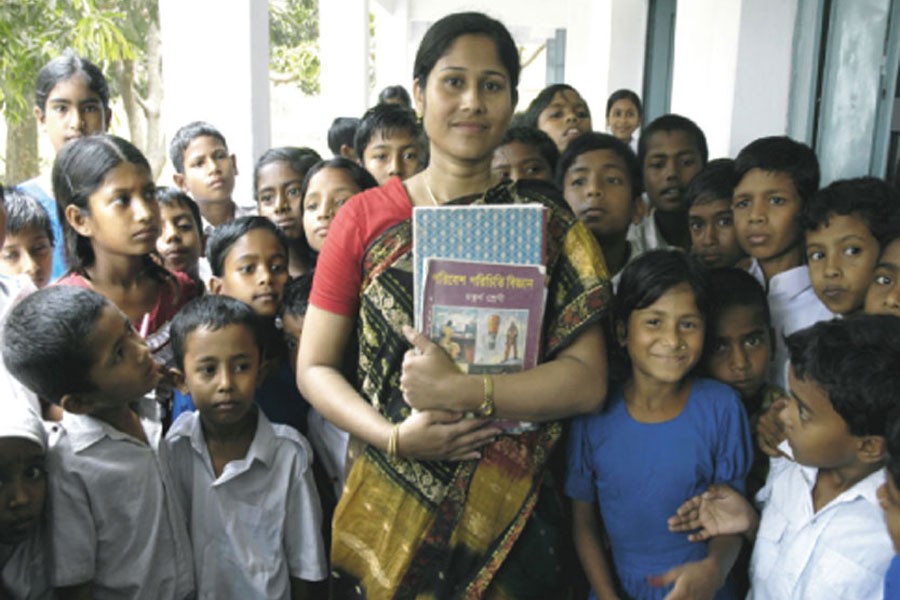
Published :
Updated :

Today, October 5, is World Teachers' Day. This year's theme of the Day is: 'Transformation of Education Begins with Teachers'. UNESCO has presented the theme for the Day, given teachers' determined and diligent efforts worldwide in the crucial stages of the Covid-19 pandemic.
Over the past few years, global transformations, including the sanitary crisis, violent conflict, social inequalities, demographic change, the digital turn, and environmental degradation, have caused the international community to reflect upon the future of education and its role in addressing these societal concerns. The International Commission on the Futures of Education report, Reimagining our futures together: a new social contract for education (UNESCO, 2021) and the Transforming Education Summit (2022) have analysed and documented these preoccupations and called for systemic change to address them. As the Covid 19 crisis revealed, teachers are the engines at the heart of our education systems, without whom it is impossible to provide inclusive and equitable quality education to every learner. The pandemic has been a challenging time, not only for the education sector; it has made us aware of our fragility and interconnectedness. And the fact that we can only cope with 21st-century challenges, such as climate change, rising inequalities and rapid technological change if we all work together.
The COVID-19 pandemic has unmistakably shown us that teachers are ready to transform education and transform learners by equipping them with foundational skills, stimulating their curiosity and ability to continue learning throughout their lives, and instilling a sense of belonging and responsibility for one another and the planet. However, education systems do not seem to be equally ready to support teachers to deploy their talent fully, leverage their knowledge and use their pedagogical judgement to transform education.
THE CHALLENGES & ROLE OF TEACHERS: The supply of teachers globally is inadequate and unequal. In 2015, almost 69 million primary and secondary teachers were needed to achieve universal primary and secondary enrolment and the Sustainable Development Goals (UNESCO-UIS, 2016). While some progress has been made, the target remains out of reach. For instance, in 2021, it was estimated that an additional 15 million teachers were still needed in sub-Saharan Africa (Teacher Task Force, 2021). Gender imbalances remain a challenge globally. In some regions, women have fewer opportunities to enter the profession. This is the case in sub-Saharan Africa, especially in secondary education (where females represent 32 per cent), tertiary education and leadership.
On the other hand, education systems fail to attract adequate numbers of males, especially in early childhood and primary education, to foster balanced teaching workforces. Inequitable deployment and distribution of teachers is also a significant challenge that impacts shortages in rural and hard-to-reach locations. Without enough teachers, classrooms are overcrowded. As a result, the transformation of education begins with teachers being overworked and demotivated, and the quality of teaching is inadequate to enable learners, especially the most vulnerable, to achieve desired learning outcomes.
The Covid-19 crisis has highlighted the critical role of teachers in supporting learning. However, many teachers are concerned that in their countries, this recognition is still not fully reflected in education policies. Most teacher unions report concerns that salary is too low, working conditions are deteriorating, and infrastructure to support teaching and learning is not a priority for government investment (Education International, 2021). In addition, teachers are rarely consulted or involved in decision-making and policy formulation processes. Their status, level of remuneration and working conditions (overcrowded classrooms, heavy workloads outside of school hours, multiple expectations from school administration and families) deter young people from entering the profession. Existing teachers also refrain from deploying their talents or remaining at work.
In 2022, the international community highlights the critical necessity of education systems to transform to meet the needs of 21st-century learners and societies coming out of the Transforming Education Summit. This transformation relies on innovations in classrooms, schools and education systems. To be able to bring innovative pedagogies and practices into classrooms, teachers need an environment that values the autonomy and leadership necessary to seize opportunities to depart from established practice.
In Bangladesh, World Teachers' Day National Observance Committee has decided to celebrate the Day in the last week of October as the significant feature of the Durga Puja celebration falls on October 5 this year. It may be mentioned here that the Day is an occasion that pays tribute to the teachers and highlights the honour and dignity of the teaching profession. However, the celebration date of the Day varies from country to country. In India, the Day is observed on September 5 on the occasion of the birth anniversary of late President Dr SharvaPalli. Radha Krishnan. Countries including Bangladesh, Armenia, Azerbaijan, Bahrain, Belgium, Bulgaria, Cameroon, Canada, Croatia, Estonia, Georgia, Germany, Kuwait, Lithuania, Maldives, Mauritius, Moldova, Mongolia, Myanmar, Netherlands, Nigeria, North Macedonia, Pakistan, Papua New, Philippines, Portugal, Qatar, Romania, Russia, Saudi Arabia, Serbia, United Arab Emirates, and United Kingdom commemorate World Teachers' Day on October 5, and each country holds its date for celebrations of this event.
Whenever World Teachers' Day is observed, more than a million teachers in Bangladesh will renew their vow to improve working conditions, status and dignity of the profession in line with the international teaching community. The theme of the Day this year will enhance their self-confidence and self-esteem. They will feel reassured that in a globalised world, they are not alone in the struggle for equity and justice. Long live World Teachers' Day.
Prof. Quazi Faruque Ahmed was member of National Education Policy-2010 Committee, member, Education Watch Bangladesh.


 For all latest news, follow The Financial Express Google News channel.
For all latest news, follow The Financial Express Google News channel.